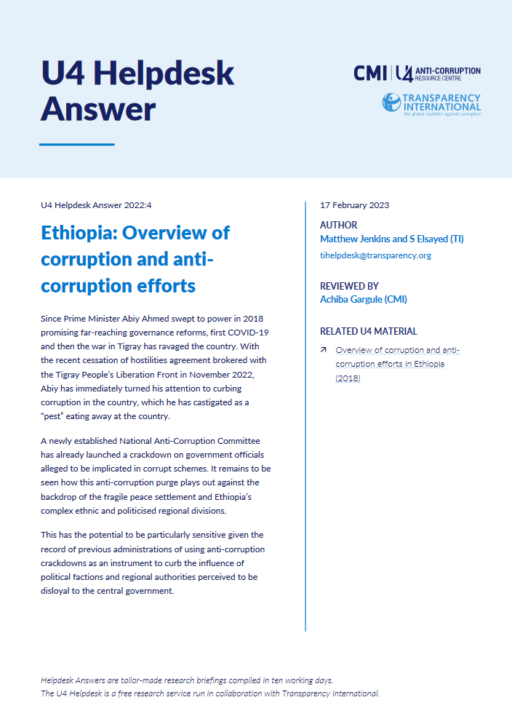
This Anti-Corruption Helpdesk brief was produced in response to a query from a U4 Partner Agency. The U4 Helpdesk is operated by Transparency International in collaboration with the U4 Anti-Corruption Resource Centre based at the Chr. Michelsen Institute.
Query
Please provide an overview of corruption and anti-corruption efforts in Ethiopia.
Summary
Since Prime Minister Abiy Ahmed swept to power in 2018 promising far-reaching governance reforms, first COVID-19 and then the war in Tigray has ravaged the country. With the recent cessation of hostilities agreement brokered with the Tigray People’s Liberation Front in November 2022, Abiy has immediately turned his attention to curbing corruption in the country, which he has castigated as a “pest” eating away at the country.
A newly established National Anti-Corruption Committee has already launched a crackdown on government officials alleged to be implicated in corrupt schemes. It remains to be seen how this anti-corruption purge plays out against the backdrop of the fragile peace settlement and Ethiopia’s complex ethnic and politicised regional divisions.
This has the potential to be particularly sensitive given the record of previous administrations of using anti-corruption crackdowns as an instrument to curb the influence of political factions and regional authorities perceived to be disloyal to the central government.
Main points
- Ethiopia is at a crossroads, emerging from a terrible internecine conflict in the north of the country, it faces huge challenges such as climate-related food insecurity, slowing economic growth, ongoing ethnic tensions and widespread corruption.
- While according to some international governance indices, Ethiopia’s political regime has made some small steps towards democratisation since Abiy took power, his efforts to transform the country from a decentralised ethnic federal system to a more centralised national republic have not gone unchallenged.
- Abiy has placed great emphasis on anti-corruption as being a core policy priority. In a recent speech to parliament, he castigated many of country’s institutions as being riddled by corruption, including the judiciary, law enforcement and state auditors.
- Apparently in an effort to curb high-level corruption, the new National Anti-Corruption Committee has been established at ministerial level, with sweeping powers. However, its remit vis-à-vis existing anti-corruption bodies remains unclear, and there are concerns it may be used to target political opponents.
Contents
- Background
- Extent of corruption
- Forms of corruption
- Legal and institutional framework
- References
Caveat
The media landscape in Ethiopia is highly polarised and often partisan, with experts consulted for this Helpdesk Answer stating that few news outlets are neutral. The author has attempted to verify news stories included in the paper by triangulating multiple sources, but this did not always prove possible. As such, some of the news reporting should be treated with caution.
Authors
Matthew Jenkins and S Elsayed (TI) [email protected]
Reviewers
Achiba Gargule (CMI)
Date
21/03/2023
Tags
 Download PDF
Download PDF
